AN afternoon sitting in Feast restaurant sampling wines with Kevin Judd?
Of all the various assignments I’ve been asked to carry out while at the JEP, this is one that didn’t require an enormous amount of persuasion to do.
Kevin is the internationally renowned winemaker who spent 25 years at the forefront of the celebrated Cloudy Bay label, before leaving to found his own label, Greywacke, in 2009.
At the time, Kevin was accused of throwing caution to the economic wind; however, the gamble paid off and Greywacke is now rapidly building a reputation every bit as formidable as that of its founder.
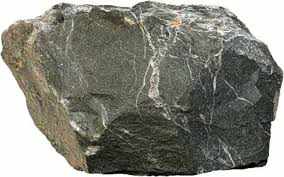
And so it is that I and several similarly enthusiastic wine novices – including Feast’s owner Laurraine Falle (‘I’m definitely more of a food expert than a wine expert,’ she admits) – have gathered in Gorey to learn from a master.
‘It’s not so much how we make our wines,’ says Kevin, ‘but where we make them. It’s all to do with geography.’
Born in England, Kevin was raised in Australia before moving to New Zealand as a young adult in 1983. It is in the Marlborough region of New Zealand where Greywacke wines are now produced.
‘New Zealand is essentially two islands in the South Pacific,’ says Kevin, ‘so they’re very much moderated by their proximity to the sea. Due to the angle of the sun, the light there is very intense and there’s a high level of UV – due to a little hole in the ozone, apparently – but although we get lots of intense sun, it’s rarely above 30 degrees. And there’s very little pollution in the air.’
All of which contributes to creating an environment perfectly suited for producing wine, says Kevin. ‘There are continental climates, where you get very hot days and very cold nights, and then maritime climates, where there’s not a big difference between the temperature at night and during the day. In New Zealand, we have a maritime climate which is ideal for producing Sauvignon and Chardonnay. It doesn’t generally suit red wine, however, which is why we’ve only a single Pinot Noir.’
In total, Kevin has provided seven different Greywacke wines for us to sample.
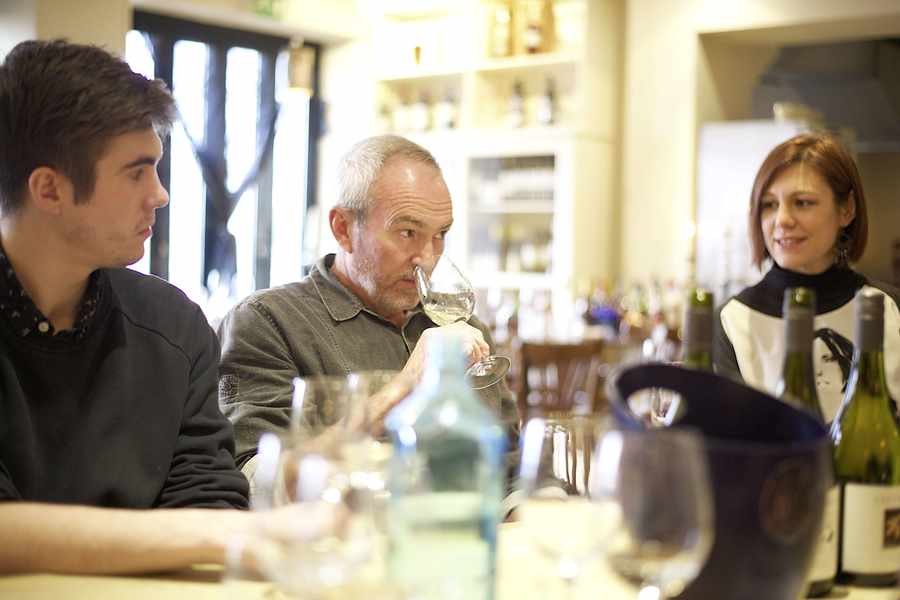
As we try them, Kevin talks us through how each wine is produced, as well as discussing his techniques and working methods – not too much information, however, ‘otherwise I’d have to kill you’.
Greywacke – ‘the name Greywacke originates from the very hard, drab-looking rock on which New Zealand sits’ – is very much an independent label, with Kevin determined to do things his own way.
Indeed, he has a number of strict policies on how Greywacke wines should be produced and distributed. ‘There’s no added acid to my wines, so they’re all very natural and very crisp,’ he says. ‘Turnaround can often be very fast.’
He points to a bottle of Sauvignon Blanc. ‘For instance, with this wine we picked the grapes in April, bottled it in August, and it was on the market by the end of the year.’
Kevin also insists on all Greywacke bottles being screw cap only: ‘Cork taint is just part of the story,’ he says. ‘Cork allows random oxidisation. And it will always impart a degree of cork taste to the wine. Cork is a piece of bark from an oak tree and will have a certain amount of flavour, which can be nice, but it’s not so nice when it alters the flavour you were hoping for.
‘I’ll always remember having a journalist visiting and I opened a bottle of nice wine for them to try, only none of them tasted right. The cork had affected the flavour. By the time I found one that tasted how it was supposed to, the journalist had left.’
Despite the label’s ever-growing success, Kevin likes to keep the entire process as down to earth as possible, with fruit picked by hand rather than by machine.
‘We own a nice little cottage, but the rest of the land is rented,’ says Kevin. ‘It’d have taken three or four years if I’d had to buy all the land needed to grow grapes on. By the time I’d done that, everyone would’ve forgotten I even existed. And I didn’t want to be looking down from the pearly gates at a load of land and nothing to show for it.’
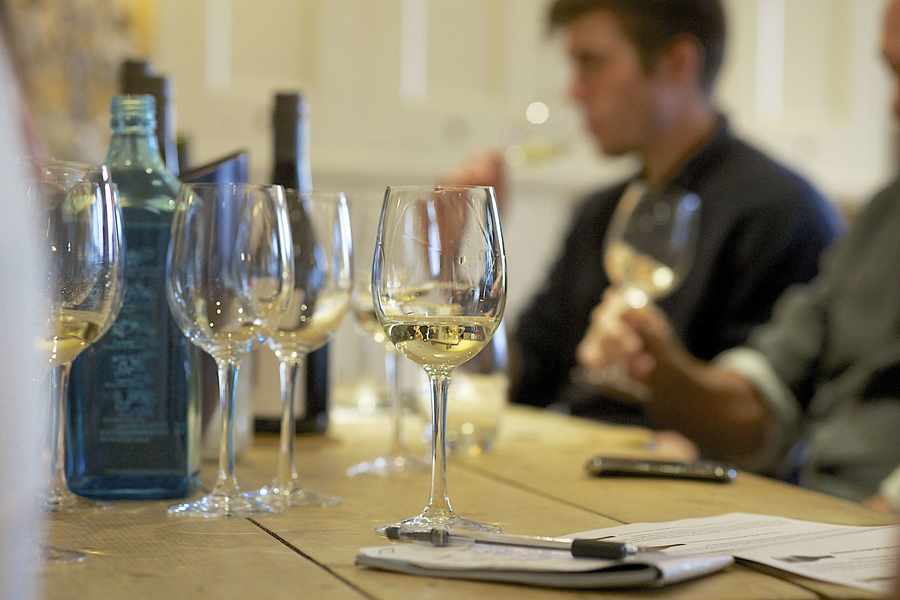
In addition to being an expert winemaker, Kevin is also a professional photographer and has set aside an entire day to take photos while in Jersey. ‘We’ll be out from dawn till dusk,’ he says. ‘This is my first visit to the Island and I’m really looking forward to photographing it. It’s a beautiful place.’
Being a lager drinker (and one with a terrible cold at that), I’d been a little concerned that I wouldn’t have the required palette to fully appreciate Kevin’s wines.
However, in the event I enjoyed them all enormously. But which of Kevin’s wines is his own personal favourite?
‘If I had to pick one wine that I’d like to become Greywacke’s signature wine, I’d go for the Wild Sauvignon,’ he says, ‘but it’s hard to pick a favourite. Every wine works in a different way at different times with different foods.
‘Having said that, if I knew I was going to get hit by the number eight bus, I’d have a glass of Chardonnay.’
Here are the Greywacke wines which were sampled at Feast along with what Kevin had to say about them…
Sauvignon Blanc 2014
A musky fusion of sweet scented fruits – nectarines, peaches and nashi pears with a dash of orange zest – intermingled with a floral perfume reminiscent of star jasmine and citrus blossom.
Kevin says: ‘It’s the classic Marlborough style. We allow it a steady but quick fermentation and it’s best drunk within the first few years of production while it’s still fruity. It goes down very easily.’
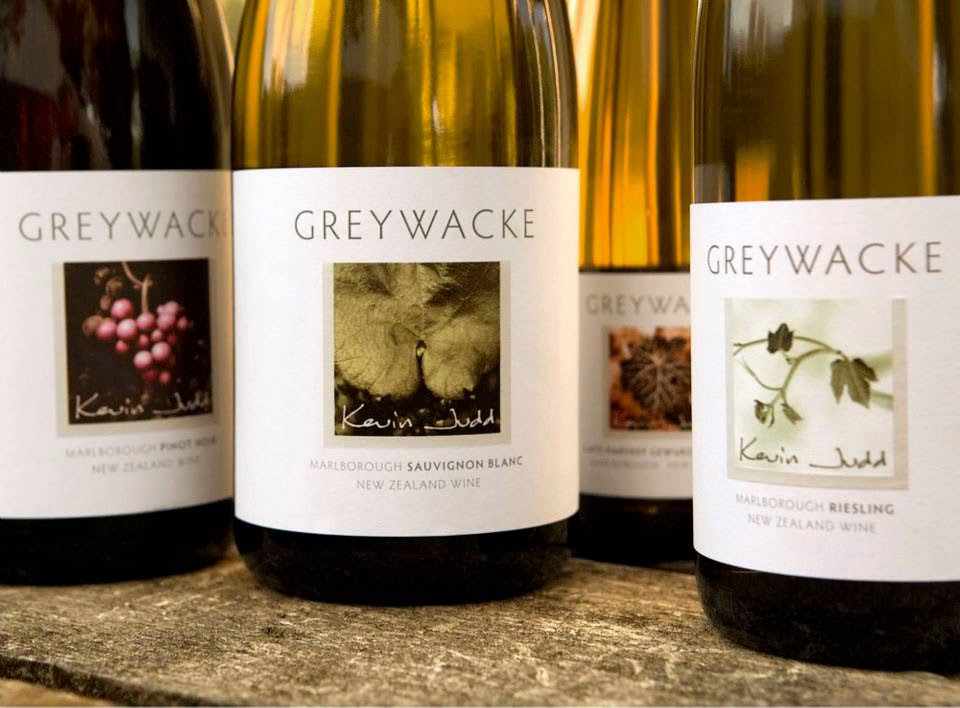
Wild Sauvignon 2012
A delicate combination of musky peach-skin aromatics and gentle citrus-blossom notes – a dash of lime cordial and a hint of saffron. The finish is succulent and crisp with an almost flinty dryness.
Kevin says: ‘Although it’s essentially grown the same way, this is a totally different take on the Sauvignon Blanc. We ferment it in old barrels, rather than in stainless steel as we would other wines, which makes it more textual and less fruity. The smell when it’s fermenting is reminiscent of a bakery.’
Chardonnay 2012
An intriguing brioche-like bouquet of roasted nuts, linseed and orange liqueur. A concentrated wine with a tight, natural acid backbone and a long crisp finish.
Kevin says: ‘There’s an amazing concentration of flavours. It’s high in alcohol because there’s a lot of fruit and we have to get the brewing process just right to ensure it tastes this way.’
Pinot Gris 2012
Voluptuous aromatics conjure thoughts of quince jam, peach skins and hard brown pears – ripe and rounded with a delicate lift of nutmeg and an earthy richness.
Kevin says: ‘This is quite a spicy wine. Someone said it reminded them of Asian massage oil. I can sort of see what they meant. There’s certainly something a little exotic about it. It’d go fantastic with Chinese food or pork dumplings, anything with a bit of spice.’
Riesling 2013
A highly fragrant style combining classic lemon/lime fruitiness with delicate pastis notes and a lavender-like floral dimension. An off-dry style that delivers a sherbet-like balance of bright acidity and a subliminal touch of sweetness.
Kevin says: ‘Riesling is hard to sell – it’s a victim of its own diversity. It works so well from extremely dry to very sweet and the poor consumer can become a bit confused. But it’s a superb wine. It’d go wonderfully with a bit of chilli crab.’
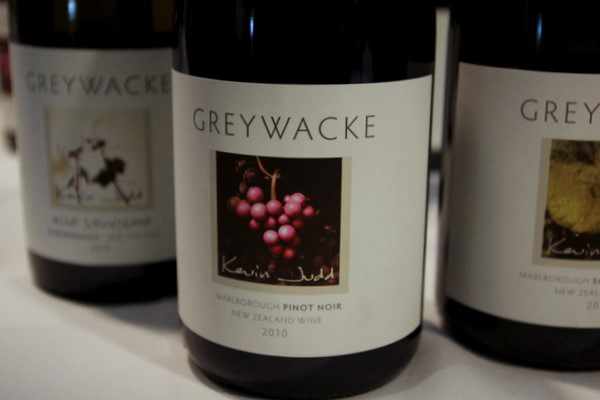
Pinot Noir 2012
A seductively aromatic concoction of vine-ripened red and black berries lightly sautéed with dried oregano and some cloves. The palate is rounded with a fruitcake richness, considerable weight and classic cool-climate vibrancy.
Kevin says: ‘The fruit is all hand-picked from a hillside vineyard. It’s a very fragrant wine.
‘It’d go great with barbeque or seafood, but nothing too spicy as that might make it seem a little flat.’
Late Harvest Riesling
A wine of intense aromatics – exotic honeysuckle blossom, candied lemon and vanilla custard, infused with a hint of cloves. Silky, succulent and harmonious – finishing with a lively citrusy crispness.
Kevin says: ‘This is a very sweet and luscious wine. It’d really work well with pancetta or citrus tarts and it’d be good with cheeses. You’d have to have it with something not too sweet though.’
Greywacke wines are available from Dunells or at Feast restaurant at Gorey Pier






